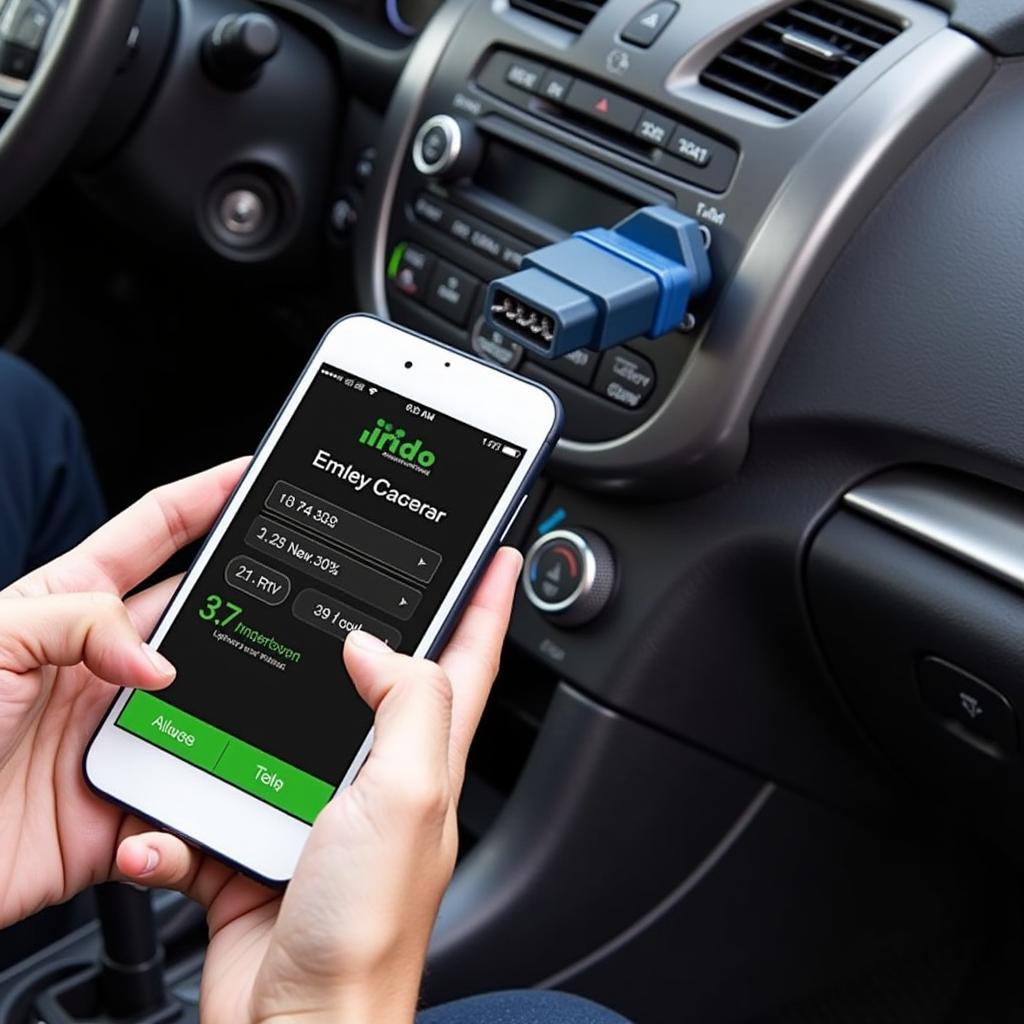Smartphone car diagnostic tools have revolutionized the automotive industry, offering DIYers and professionals alike a convenient and affordable way to diagnose car problems. But what are the essential features to look for in these tools? Choosing the right tool can be overwhelming with so many options available. This guide delves into the key features and considerations to help you make an informed decision.
Understanding Smartphone Car Diagnostic Tools
Before diving into the specifics, it’s crucial to understand how these tools function. Smartphone diagnostic tools connect to your car’s onboard diagnostic system (OBD-II port) via Bluetooth or WiFi. They interpret the data transmitted from your vehicle’s computer and display it in a user-friendly format on your smartphone or tablet.
Essential Features to Consider
1. Compatibility: Your Phone and Your Car
The first step is ensuring the diagnostic tool is compatible with both your smartphone’s operating system (iOS or Android) and your car model. Most modern tools support a wide range of vehicles, but it’s always best to double-check before making a purchase.
2. Reading and Clearing Diagnostic Trouble Codes (DTCs)
At the heart of any car diagnostic tool is its ability to read and clear DTCs. When your car’s check engine light illuminates, it means the onboard computer has stored a trouble code. Your diagnostic tool should be capable of:
- Retrieving and Displaying DTCs: Look for tools that provide a clear explanation of each code, going beyond just displaying the alphanumeric string.
- Clearing DTCs: Once you’ve addressed the underlying issue, the tool should allow you to clear the codes, turning off the check engine light.
3. Real-Time Data Monitoring
Beyond reading codes, the ability to view live data from your car’s sensors is invaluable. This feature lets you:
- Monitor Engine Performance: Track parameters like RPM, coolant temperature, oxygen sensor readings, and more.
- Diagnose Intermittent Issues: Identify problems that might not trigger a DTC but still affect performance.
- Analyze Data Logs: Some tools allow you to record and analyze data over time, helping to pinpoint the root cause of issues.
4. Additional Features: Adding Value
While the core functions are essential, several additional features can enhance your diagnostic experience:
- ABS and Airbag Support: Diagnose problems related to your vehicle’s anti-lock braking system (ABS) and airbag control module.
- Battery Monitoring: Keep tabs on your car battery’s health and receive alerts if there are any issues.
- Emissions Readiness Check: Determine if your vehicle is ready to pass an emissions test.
- Customizable Dashboards: Tailor the interface to display the data points you use most frequently.
Choosing the Right Tool for Your Needs
The best smartphone car diagnostic tool for you depends on your individual requirements and budget:
- DIY Enthusiasts: For basic maintenance and troubleshooting, a tool with core features like DTC reading, clearing, and real-time data monitoring should suffice.
- Professional Mechanics: Mechanics or advanced users might require tools with advanced features like ABS/airbag support, bi-directional controls (for activating components), and data logging capabilities.
Conclusion
Smartphone car diagnostic tools empower car owners with the knowledge and tools to understand and address vehicle issues. By considering the essential features outlined above, you can choose a tool that meets your specific needs and budget, ultimately saving you time and money in the long run.
FAQs
Q: Can I use a smartphone diagnostic tool to program new keys?
A: No, most smartphone diagnostic tools do not offer key programming capabilities. This functionality typically requires specialized equipment.
Q: Do I need an internet connection to use a smartphone diagnostic tool?
A: While an internet connection is not required for the tool to communicate with your car, it’s often needed to download app updates, access online databases for code definitions, or utilize cloud-based features.
Q: Are smartphone diagnostic tools as accurate as professional-grade scanners?
A: While they provide a wealth of information, smartphone tools may not have the same depth of functionality or diagnostic capabilities as professional-grade scanners used by dealerships and specialized mechanics.
Q: Can I use a smartphone diagnostic tool on multiple vehicles?
A: Yes, most tools are compatible with a wide range of car makes and models, allowing you to use them on multiple vehicles.
Q: What is the difference between Bluetooth and WiFi-enabled diagnostic tools?
A: Bluetooth tools offer a more stable connection for short-range communication with your car, while WiFi tools might provide faster data transfer rates.
Need help?
For any assistance or inquiries, feel free to reach out to our dedicated customer support team:
WhatsApp: +1(641)206-8880
Email: [email protected]
We’re available 24/7 to assist you!


